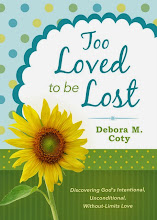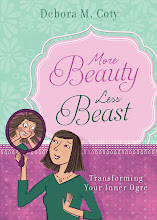| Deb in Speaker mode |
| The kind of audience every speaker loves |
I believe my response to this well meaning gal is pertinent to many beginning authors:
Yes, I'd say pretty much ALL faith-based author/speakers that I've ever met have that same goal - to draw the secular to Christ through their books or presentations. The problem is that agents and publishers will scoff if you answer that question in that way, because to them, books are only sold to book buyers (bookstores, etc) by being one or the other, not straddling the line.
The hard truth is that non-Christians rarely pick up Christian books (intentionally), and sometimes get extremely angry if the book mentions even one scripture if it was marketed to them as secular. I just read a blog post about a very ugly incident to that effect that was written by a Christian agent about someone who bought her client's book that wasn't advertised as Christian, but contained a subtle Christian message. The buyer was highly offended, considered it false advertising, demanded a refund, and groused about it all over the internet.
Apparently this happens all the time. And vice versa, of course. Perhaps it's not fair, but it's the way it is. You pretty much have to have the overall label Christian, Inspirational, or NOT to make any headway with first agents, then publishers. They operate by labels and if you can't, they won't waste their time on you.
The "great author/speakers" you mentioned are all labeled Christian by the industry and have been able to carry over to a general audience (not secular, but general) because of their enormous platforms they've built through years of promoting their work as pertinent to both worlds. It's unlikely that you or I will achieve that in our lifetimes, unless we manage to land a national television audience or internet show that draws millions.
Oh, no one says you can't start out billing yourself a crossover author, but it will just make the path bumpier for you. Once you're established in one side or the other and have obtained a loyal readership, then you have a better chance of successfully crossing over.
One solution is to do what I did and pitch your book as "written from a Christian perspective, but seeker-friendly." That way pubs know you're in the Christian camp, but your manuscript has gift book potential or would be unoffensive for those not particularly looking for a "Christian book." I get letters all the time from readers who have bought my books for their non-believing friends because they were, "just the non-intimidating, gentle faith-sharing message I've been looking for."
You know, it's like the advice given to newbie writers who try to write by their own rules instead of adhering to the established rules of the trade: Sure, you can write like ee cummings or Hemingway if you want. But you're NOT ee cummings or Hemingway and you'll very likely still be trying to get published ten years from now because you haven't paid your dues to become ee cummings or Hemingway as they did.
Wait until you've proven you know how to follow the rules before you break them.
How about you, friend? What has been your experience in crossing over?





